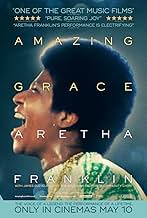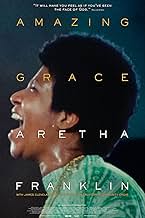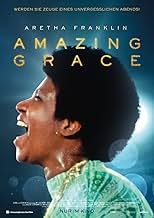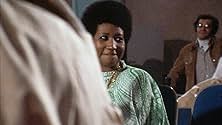Um documentário com Aretha Franklin e o coral da New Bethel Baptist Church em Watts, Los Angeles, em janeiro de 1972.Um documentário com Aretha Franklin e o coral da New Bethel Baptist Church em Watts, Los Angeles, em janeiro de 1972.Um documentário com Aretha Franklin e o coral da New Bethel Baptist Church em Watts, Los Angeles, em janeiro de 1972.
- Prêmios
- 2 vitórias e 15 indicações no total
- Self
- (cenas de arquivo)
- Self
- (cenas de arquivo)
- Self - Choir Director
- (cenas de arquivo)
- Self - Guitar
- (cenas de arquivo)
- Self - Organ
- (cenas de arquivo)
- Self - Percussion
- (cenas de arquivo)
- Self - Drums
- (cenas de arquivo)
- (as Bernard Purdie)
- Self - Bass
- (cenas de arquivo)
- Self - The Southern California Community Choir
- (cenas de arquivo)
- Self - The Southern California Community Choir
- (cenas de arquivo)
- Self - The Southern California Community Choir
- (cenas de arquivo)
- Self - The Southern California Community Choir
- (cenas de arquivo)
- Self - The Southern California Community Choir
- (cenas de arquivo)
- Themselves - The Southern California Community Choir
- (cenas de arquivo)
- Self - The Southern California Community Choir
- (cenas de arquivo)
- Self - The Southern California Community Choir
- (cenas de arquivo)
- Self - The Southern California Community Choir
- (cenas de arquivo)
- Self - The Southern California Community Choir
- (cenas de arquivo)
Avaliações em destaque
Director Sidney Pollack was hired to document this recording. This film at times seems unfinished or one big revival but that's not why you should buy a a ticket. You're watching sheer talent at hand - raw, unadulterated talent given by God. Aretha in her element joined by the California Community Choir and The Reverend James Cleveland provide the audience a spiritual elevation. This movie isn't about cinematic perfection; it's about touching your soul. Some of my favorite moments are her rendition of "Mary Won't You Weep" and her mash-up of "Precious Lord, Take My Hand, and You've Got Friend" made famous by James Taylor. Only Aretha could turn a secular song and incorporate it into a gospel hymn.
Aretha like most artists of her caliber was a perfectionist and didn't want the movie to be released while she was alive, but I'm glad that her family differed in her view. There is a whole generation that never got to experience this Aretha and now they can.
You will get a chance to see her Father the Reverend C.L Franklin and the tight bond they shared. There are also other celebrities in the building such as Clara Ward, and if you pay close attention, an enthusiastic Mick Jagger is sitting in the back.
This movie is a reverence to a time when black America was no longer defining itself by white standards but firmly standing in its blackness. Aretha was our queen and the church our foundation. She was our refuge our joy our Amazing Grace. All hail the Queen.
Diversity: This movie gets a ten. It doesn't get any blacker than Aretha and gospel music.
Scale: I highly recommend this movie not because Aretha was my favorite singer but because we could use a little spiritual revival during these dark times. A rousing 8 and Amen.
In this documentary by Sydney Pollack, one can see noted people like Mick Jagger seated in the church audience. The interaction of professional studio technicians with actual church goers have an unnerving feel, in the end via Aretha's vocals made them come together. There's a short appearance of Aretha's father, Rev. Franklin who gives a small insight to her childhood.
It's just a wonderful time capsule that has been unearthed for a digital generation to appreciate this musical form. Aretha sings from another plane and sits naturally in this church/recording session like her father says in the film that Aretha Franklin NEVER left the church.
THIS FILM IS MILDLY RECOMMENDED.
IN BRIEF: A wonderful musical performance lost in a woefully patched-together film.
JIM'S REVIEW: In 1972, director Sydney Pollack recorded a young, gifted, and black Aretha Franklin in an intimate concert. The Queen of Soul decided to become The Queen of Gospel for her next album. Recorded over two nights at the New Temple Missionary Baptist Church in Los Angeles before a live audience, the director filmed over 20 hours for his concert film (which never saw the light due to technical issues with the film's synchronization.) However, the results from the concert performances weren't lost, as the audio tapes soon became the most successful gospel album of all time, Amazing Grace.
Today, that film footage is not lost either in the latest documentary given the same moniker. Filmmaker Alan Elliott took the archival footage and reworked the film stock by the late Mr. Pollack to allow today's moviegoing audience to experience this musical event. The result is decidedly mixed, vocally strong and inspiring, but visually lacking in quality and emotion. Technically the film has a grainy unprofessional quality and the editing by Jeff Buchanan quite pedestrian, although I imagine it must have been a arduous task. The subject is always compelling, it's the execution that is underwhelming. (The Franklin family tried unsuccessfully to prevent the film's distribution, but it remains a fascinating glimpse into this mega-star, despite the rough cut look of the documentary.)
Nevertheless, there she is. Miss Aretha in her glory, serving it up to her Lord, herself now resurrected on the big screen. The euphoria of that evening is contagious with Rev. James Cleveland as the gregarious emcee and host, Alexander Hamilton as the energetic choir master, and the Southern California Community Choir as Franklin's harmonious back-up group reacting in complete abandon. (Mike Jagger, as an audience member, certainly enjoyed himself as well.)
While the documentary is a lasting chronicle of one of the most talented musical icons, the concert itself offers little insight or depth about this legendary performer's life and persona. Ms. Franklin says very little throughout the proceedings and shares none of her inner thoughts or opinions with her audience. She sings on rote, a musical powerhouse taking centerstage, yet her personality is lost to her musical selections. The voice remains a phenomenal instrument, but the performance is stunted due to her inability to communicate between numbers. She performs nearly a dozen inspirational songs, which, grew a tad monotonous for this reviewer. Her substantial talent almost made this agnostic into a believer, but not quite.
For die-hard Aretha fans, this film is a must-see. (That's you, Wolfgang!) Others may be slightly bored by the actual concert, although the audience reaction during the performance is highly entertaining and Ms. Franklin vocal demands are met. Still, one also wishes the filmmakers dealt more directly with the concert and its aftermath. Perhaps interviews with members of that 1972 audience and their personal memories could have added more exposition to the event.
Amazing Grace gives Aretha much R-E-S-P-E-C-T in celebrating her musical talents. The documentary certainly captures the rhythm, but it misses the mark in delving into her soul.
Você sabia?
- CuriosidadesDirector Sydney Pollack was totally inexperienced in shooting music documentary and shot without clapper boards snapping shut at the beginning of each take to help synchronize sound and picture in post-production. As a result of this mistake, even after months of work by experts, the 20 hours of footage couldn't be synchronized with the audio tracks. The choir director from the Watts recordings was brought in to try to lip-read the reels, but after months of work, only about 150 minutes of footage had been matched with sound, none of it adding up to a complete, useable song. Deadlines passed as the "Amazing Grace" album came out in June 1972, selling millions with no synergy. In August, Warner Bros. officially wrote off and shelved the movie. Pollack never gave up on the project, but constantly had other commitments. In 2007, dying of cancer, Pollack finally handed the documentary project over to producer and music enthusiast Alan Elliott.
- Citações
Rev. Franklin: I went in the cleaners one day in Detroit to pick up some clothes, and Aretha had appeared on a recent television show. And she told me, "I saw your daughter Aretha last night." I said, "Yes? How did you like it?" She said, "It was all right. But I'll be glad when she comes back to the church." I said, "Listen baby, let me tell you something. If you want to know the truth, she has never left the church."
- Cenas durante ou pós-créditosThe film concludes with a 1972-era Warner Bros. ending card, even though WB technically no longer has any ties to the film, to suggest how it would have played out had the project been completed and released when initially intended.
- ConexõesFeatured in Mark Kermode's Secrets of Cinema: Pop Music Movies (2021)
Principais escolhas
- How long is Amazing Grace?Fornecido pela Alexa
Detalhes
- Data de lançamento
- País de origem
- Centrais de atendimento oficiais
- Idioma
- Também conhecido como
- Чудова ласка
- Locações de filme
- Empresas de produção
- Consulte mais créditos da empresa na IMDbPro
Bilheteria
- Faturamento bruto nos EUA e Canadá
- US$ 4.450.456
- Fim de semana de estreia nos EUA e Canadá
- US$ 57.353
- 9 de dez. de 2018
- Faturamento bruto mundial
- US$ 7.796.112
- Tempo de duração
- 1 h 29 min(89 min)
- Cor
- Proporção
- 1.78 : 1

























